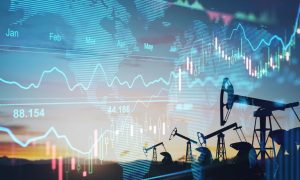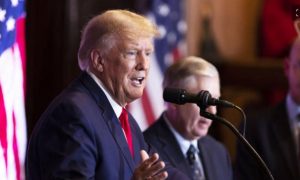Something strange is happening with the federal budget this year.
The deficit has exploded, more than doubling in the first 10 months of the fiscal year compared with the same period last year. Such a surge typically could be expected to stimulate growth and, in turn, inflation.
But inflation has steadily dropped over the same period. The mismatch is a reminder that wider deficits don’t always lead to higher inflation, a potentially important lesson as the gap between spending and revenue grows in the future.
The reason lies in what drives the deficits. Often, when the gap widens, it is because Congress has approved a big spending package or cut taxes. During the heights of the Covid-19 pandemic in 2020 and 2021, for example, the government showered Americans with stimulus checks and tax credits.
That kind of direct support stimulates the economy, helping to push inflation to its recent peak of 9.1% in June of last year. The New York Fed found that fiscal policy was responsible for about one-third of the inflation between December 2019 and June 2022.
This year, though, among the causes of the growing deficit is a steep drop in tax revenue paid quarterly or through annual tax returns, rather than taxes withheld by employers. So-called nonwithheld tax revenue is down $278 billion, or 26%, so far this year.
After financial markets soared in 2021, the government brought in a record-breaking tax haul last year as taxpayers reported their realized gains. Net capital gains among U.S. taxpayers increased by 67% to roughly $2 trillion in 2021, according to IRS data. This year, after markets sagged in 2022, revenue from capital-gains taxes has tumbled.
On the other side of the ledger, the largest spending increase has been in paying interest on old debt. Government spending on interest on the debt has risen by $136 billion, or 23%, as higher interest rates increase the cost of borrowing.
Read More – The Horoscope For Saturday, September 3, As Venus Retrograde Finally Ends
Neither lower capital-gains tax receipts nor higher debt payments feed directly back into the economy in the short term—and neither do other reasons for the mushrooming deficit, such as roughly $100 billion in reduced Federal Reserve earnings, a result of higher interest rates.
A model created by economists at the Brookings Institution shows that fiscal policy this year has slowed economic growth, despite the higher spending and lower tax revenue. In the second quarter, growth in gross domestic product was 0.8 percentage point lower because Covid-19 fiscal stimulus is no longer boosting the economy, they found. GDP grew at a 2.1% annual rate in the second quarter.
“The stuff that is pushing up the deficit is not going into GDP, so it’s not like the government is doing a lot of stimulus. It’s just from an accounting perspective the deficit is getting bigger,” said Louise Sheiner, the policy director at Brookings’s Hutchins Center on Fiscal and Monetary Policy and a former Fed economist.
Still, higher inflation has been adding to the deficit this year. The Fed’s interest-rate increases to combat inflation raise the government’s borrowing costs. Some government outlays are indexed to inflation: Spending on Social Security is up 10% so far this fiscal year, according to the Treasury Department.
A looser relationship between higher deficits, economic growth and inflation means there may be less to fear about budget shortfalls in the future.
Read More – The ‘Harry Potter’ cast, ranked by net worth
Over the long run, under current law, the Congressional Budget Office expects deficits to keep growing, reaching 7.3% of GDP in 2033, an increase from 5.5% last year. Spending on net interest on the debt is projected to rise to 3.7% of GDP over the same period, from 1.9% last year. Inflation, meanwhile, will have settled at the Fed’s 2% target in 2033, the CBO projects.
A potential wild card is the spending unleashed by the Inflation Reduction Act, which is subsidizing clean-energy projects across the country. The uptake in the subsidies has so far outpaced the CBO’s expectations, meaning the bill could end up adding to, rather than reducing, the deficit.
A recent Goldman Sachs analysis found that the subsequent jump in investment in manufacturing equipment and facilities is increasing economic growth in the short term. GDP growth will be 0.2 percentage point higher in the next three quarters because of the increased investment, the Goldman analysis found.
It is too soon to say whether the bevy of spending and tax cuts will push up inflation. Prices for materials and workers in certain sectors may rise, while the clean-energy investments could help control energy costs, an important inflation factor, in the long run.
“The overall inflation rate is a weighted average of a bunch of things that is not going to be dramatically impacted by the Inflation Reduction Act in the short run,” said Kent Smetters, a professor at the University of Pennsylvania’s Wharton School who studies the budget. “The connection between inflation and fiscal stuff has often been overstated or misunderstood.”
Still, Smetters and other economists say rising deficits can pose economic problems—raising borrowing costs and crowding out private investment.
“Fiscal policy should not be concerned about year-to-year changes in inflation, or growth for that matter,” said former CBO Director Douglas Holtz-Eakin, now president of the American Action Forum, a conservative think tank. “They should let the Fed take care of inflation and set fiscal policy long term to promote growth—and that means structural steps to reduce the deficit.”































